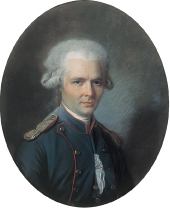A Quote by Henry Wadsworth Longfellow
Sometimes we may learn more from a man's errors, than from his virtues.
Related Quotes
The study of the errors into which great minds have fallen in the pursuit of truth can never be uninstructive. . . No man is so wise but that he may learn some wisdom from his past errors, either of thought or action, and no society has made such advances as to be capable of no improvement from the retrospect of its past folly and credulity.
Man is naturally more disposed to beneficent than selfish actions. This we learn even from the history of savages. The domestic virtues have something in them so inviting and genial, and the public virtues of the citizen something so grand and inspiring, that even he who is barely uncorrupted, is seldom able to resist their charm.
Every time man makes a new experiment he always learns more. He cannot learn less. He may learn that what he thought was true was not true. By the elimination of a false premise, his basic capital wealth which in his given lifetime is disembarrassed of further preoccupation with considerations of how to employ a worthless time-consuming hypothesis. Freeing his time for its more effective exploratory investment is to give man increased wealth.
It may be the will of Heaven that America shall suffer calamities still more wasting, and distresses yet more dreadful. If this is to be the case, it will have the good effect at least. It will inspire us with many virtues, which we have not, and correct many errors, follies and vices. But I must submit all my hopes and fears to an overruling Providence, in which, unfashionable as the faith may be, I firmly believe.
Nothing is more unjust, however common, than to charge with hypocrisy him that expresses zeal for those virtues which he neglects to practice; since he may be sincerely convinced of the advantages of conquering his passions without having yet obtained the victory as a man may be confident of the advantages of a voyage or a journey, without having courage or industry to undertake it, and may honestly recommend to others those attempts which he neglects himself.
If idioms are more to be born than to be selected, then the things of life and human nature that a man has grown up with--(not that one man's experience is better than another's, but that it is 'his.')--may give him something better in his substance and manner than an over-long period of superimposed idiomatic education which quite likely doesn't fit his constitution. My father used to say, 'If a poet knows more about a horse than he does about heaven, he might better stick to the horse, and some day the horse may carry him into heaven'







































